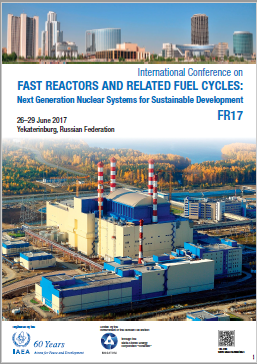Speaker
Prof.
Leonid Bolshov
(Nuclear Safety Institute of the Russian Academy of Sciences)
Description
L.A.Bolshov, V.F.Strizhov, D.A. Klinov, A.A. Kamaev, V.V.Lemekhov, A.V.Moiseev, S.F.Shepelev, B.A.Vasiliev
The approaches to assurance and justification of safety of the new generation of fast liquid metal reactors with sodium and heavy coolants that are currently being developed in Russia are presented.
The accepted safety concept deals with some aspects including:
• Assurance of nuclear safety by minimizing of potential hazard (reactivity excess, sodium void effect of reactivity), strengthening of the negative feedback (reactivity coefficient) and development of passive elements affecting reactivity based on hydraulic and temperature principle;
• Design solutions for safety improvement by integrated configuration of RI that excludes a loss-of-coolant accident;
• Using of the possibilities for long accumulation of residual energy without reaching a dangerous temperature level;
• Development of primary circuit systems for residual heat removal by natural circulation with passive principles of initialization of their operation;
• Improvement of reliability of main equipment and safety systems.
Design of the fast sodium reactor BN-800 that was put into operation in 2016 ensures safety at a level corresponding to GEN III+ nuclear installation due to inherent safety and improved and new safety system compared to the operating BN-600.
The BN-1200 design will meet the requirements for GEN IV nuclear installation taking into account the further optimization of safety systems and new technical solutions.
The purpose of developing the BREST-OD-300 reactor is to demonstrate the ability to achieve a high level of safety and competitiveness by using a new coolant, fuel and constructive solutions, as well as to gain experience of reactor closed fuel cycle operation within the frameworks of prototype power system.
The closed fuel cycle operation of reactor core in equilibrium mode using dense nitride fuel is possible for both projects.
The objective of new generation of nuclear installations is to exclude the severe accidents resulting in potential necessity of such protective measures as population evacuation and resettlement. The presentation shows that this objective is achieved by new Russian projects of power units equipped with BN-1200 and BREST-OD-300 reactor installations.
One of the basic elements of new project safety justification is a system of the Russian codes of new generation aimed at creation of new precision calculation systems describing a wide spectrum of physical processes and phenomena on the basis of multiphysics and multiscale modeling.
It is noticed that the development of installations with essentially new specifications has required an improvement of existing regulations, especially for lead coolant reactors. The main directions of legislation and regulation enhancement planned in the Russian Federation are presented; the high potential of international cooperation in this field is emphasized.
Country/Int. Organization
Russian Federation
Author
Prof.
Leonid Bolshov
(Nuclear Safety Institute of the Russian Academy of Sciences)
Co-author
Mr
Yury Khomyakov
(Private institution «Innovation and technology center for the «PRORYV» project»)

